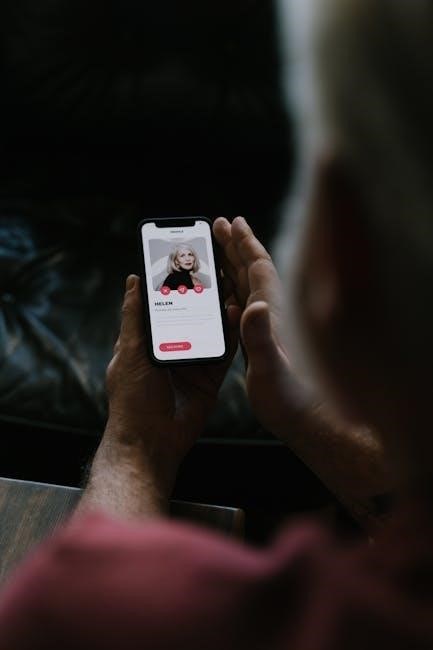guide on how to fail at online dating

Online dating has become a popular yet challenging way to connect. Many struggle with creating authentic profiles‚ communicating effectively‚ and managing expectations. This guide explores common pitfalls to avoid.
Why People Fail at Online Dating
People often fail at online dating due to lack of authenticity‚ ineffective communication‚ and unrealistic expectations. Misaligned intentions‚ poor profile setups‚ and ignoring red flags also contribute to unsuccessful experiences. Additionally‚ misinterpreting signals‚ being overly aggressive‚ or neglecting personal boundaries can hinder meaningful connections and lead to disappointment.
The Purpose of This Guide
This guide aims to highlight common mistakes people make in online dating‚ offering insights into pitfalls such as poor communication‚ unrealistic expectations‚ and ignoring red flags. By understanding these errors‚ readers can avoid similar issues and improve their chances of building meaningful connections in the digital dating world.

Creating a Terrible Online Dating Profile
A poorly crafted profile often leads to failure in online dating. Using unflattering photos‚ writing a vague bio‚ and listing unrealistic expectations can deter potential matches immediately.
Using Unflattering or Misleading Photos
Using poorly lit‚ outdated‚ or misleading photos can instantly deter potential matches.Blurry images or photos that hide your true appearance often lead to disappointment or distrust when meeting in person.
Writing a Vague or Negative Bio
A vague or overly negative bio can repel potential matches. Avoid generic statements like “I’m funny” without examples. Negative remarks about past experiences or overly critical language can create a pessimistic impression. Be specific and positive to attract like-minded individuals.
Listing Unrealistic Expectations
Setting overly high standards or demanding perfection can deter potential matches. Unrealistic expectations often lead to disappointment and missed opportunities. Avoid listing rigid criteria that prioritize superficial traits over genuine connection. Focus on qualities that foster meaningful relationships rather than unattainable ideals.
Poor Communication Habits
Poor communication habits‚ such as sending generic messages or overwhelming matches‚ can drive potential connections away. Learn how these mistakes sabotage relationships and hinder genuine connections.
Sending Generic or Boring Messages
Sending generic messages like “Hey” or “What’s up?” shows a lack of effort and fails to spark genuine interest. These messages are often seen as lazy and unoriginal‚ making it harder to stand out. Without personalization or thought‚ conversations fizzle quickly‚ leaving matches unimpressed and disengaged. Avoid this by asking specific questions or showing genuine curiosity about their profile details.
Overwhelming or Ignoring Matches
Sending excessive messages or ignoring matches altogether can harm connections. Overwhelming someone with constant communication may seem desperate or suffocating‚ while ignoring them leads to disengagement. Both extremes show poor communication skills and a lack of balance‚ often causing matches to lose interest or feel uneasy about continuing the interaction.
Misinterpreting Signals
Misinterpreting signals is a common mistake in online dating. Overestimating someone’s interest or ignoring red flags can lead to misunderstandings. For example‚ assuming a match’s silence means disinterest or misreading casual chats as deep connections. This misjudgment often stems from projecting one’s own feelings onto the other person‚ rather than objectively assessing their behavior and responses.
Red Flags to Ignore
Ignoring red flags like inconsistent stories‚ dishonesty‚ or evasive behavior can lead to trust issues or even scams. Overlooking these signs often results in disappointing outcomes.
Not Researching Potential Matches
Not researching potential matches can lead to unpleasant surprises‚ such as discovering hidden agendas or misrepresented identities. Overlooking red flags like inconsistent stories or suspicious behavior often results in scams or emotional distress‚ as seen in cases where fake photos and dishonest intentions caused financial loss and trust issues.
Overlooking Inconsistent Stories
Overlooking inconsistent stories can lead to misunderstandings or deception. Matches may share conflicting details about their lives or avoid certain topics‚ signaling potential dishonesty. Ignoring these signs can result in emotional distress or even financial loss‚ as seen in cases where fake identities and misleading information were used to manipulate others online.
Dismissing Gut Feelings
Ignoring your intuition can lead to missed red flags. If something feels off about a match’s behavior or stories‚ don’t brush it aside. Many online dating failures stem from overlooking gut feelings‚ leading to emotional distress or even financial loss‚ as seen in cases where fake identities and misleading information were used to manipulate others online.
Making a Bad First Impression
A poor first impression can doom online dating efforts. Being overly aggressive‚ using cheesy pickup lines‚ or sharing inappropriate jokes can quickly turn potential matches away.
Being Too Forward or Aggressive
Being overly aggressive or forward in online dating can alienate potential matches. Sending explicit messages‚ making inappropriate jokes‚ or pushing for personal information too quickly creates discomfort. Respect boundaries to build genuine connections and avoid scaring people off with overly intense behavior early on.
Bringing Up Sensitive Topics Too Soon
Discussing sensitive topics like past relationships‚ finances‚ or politics too early can overwhelm potential matches. Such conversations require trust and timing. Jumping into heavy subjects without building rapport often leads to discomfort or disinterest‚ making it harder to create a meaningful connection.
Using Cheesy Pickup Lines
Relying on cheesy pickup lines can make you appear insincere or lazy. Overused phrases like “Are you a magician?” or “Do you have a name?” often fall flat. They may come across as unoriginal‚ failing to spark genuine interest. Instead of creating a connection‚ they can lead to eye-rolling or disengagement.
Sabotaging Conversations
Sabotaging conversations often stems from self-centered talking‚ negativity‚ or avoiding personal topics. Over-sharing or dominating discussions can alienate matches‚ hindering genuine connections and mutual interest.
Talking Only About Yourself
Dominating conversations with self-centered talk alienates potential matches. Failing to ask questions or show interest in others leads to disengagement. Over-sharing personal achievements or hobbies without inviting dialogue creates imbalance‚ making connections superficial and unappealing. This habit intimidates or bores others‚ undermining the chance to build mutual understanding and genuine rapport. It fosters disinterest and detachment in online interactions. Avoid this to succeed.
Being Negative or Pessimistic
A consistently negative or pessimistic attitude repels potential matches. Complaining about past experiences‚ focusing on flaws‚ or expressing hopelessness creates an unpleasant interaction. This mindset fosters disconnection‚ as others seek positivity and shared growth. Overemphasis on shortcomings discourages deeper engagement‚ making it harder to build meaningful connections. Avoid this behavior to improve your online dating success. Insights from online interactions highlight its impact on relationships.
Avoiding Personal Questions
Avoiding personal questions prevents meaningful connections. Refusing to share or ask about interests‚ values‚ or goals keeps conversations superficial. This reluctance to open up fosters mistrust and disengagement. Matches lose interest when they can’t gauge compatibility or depth. Avoiding personal topics hinders intimacy‚ making it harder to build lasting relationships. Openness is key to successful online dating interactions and trust-building.
Ignoring Boundaries
Ignoring boundaries can ruin trust and respect in online dating. Pressuring for personal details‚ not respecting “no‚” and overstepping can lead to discomfort and lost connections quickly.
Pressuring for Personal Information
Pressuring for personal details early on is a common mistake. It makes others uncomfortable and can damage trust. Pushing for photos‚ financial info‚ or intimate stories too soon raises red flags and often leads to lost connections quickly.
Not Respecting “No” or “Slow Down”
Ignoring someone’s request to slow down or refusing to accept “no” is a significant mistake. It disregards their boundaries and autonomy‚ leading to discomfort and mistrust. This behavior often results in relationships ending prematurely‚ as it shows a lack of respect for the other person’s needs and feelings in the interaction.
Overstepping in the Relationship
Overstepping boundaries by moving too quickly emotionally or physically can make the other person feel uncomfortable. Ignoring their need for space leads to mistrust and resentment. This behavior often results in the relationship ending abruptly‚ as it demonstrates a lack of respect for their boundaries and personal space‚ making it difficult to build a healthy connection.

Unrealistic Expectations
Believing in instant chemistry or the “perfect match” myth often leads to disappointment. Expecting a partner to change or ignoring differences hinders genuine connections and growth.
Expecting Instant Chemistry
Believing that sparks must fly immediately can lead to disappointment. Real connections often develop over time through shared experiences and mutual understanding‚ not instant attraction or perfection.
Believing in “The One” Myth
Thinking there’s a single perfect match can lead to disappointment. This myth creates unrealistic expectations‚ causing people to overlook compatible partners. It fosters an unhealthy focus on fantasy rather than building genuine connections with real individuals.
Not Being Open to Differences
Refusing to accept differences in opinions‚ hobbies‚ or lifestyles can hinder meaningful connections. Being rigid in expectations often leads to missed opportunities. For example‚ misunderstandings in online interactions‚ like Huaizhi’s initial attraction due to a misunderstanding‚ show how being closed off can prevent genuine relationships from forming and lead to unnecessary conflict or disconnection.

Failing to Build Trust
Trust is foundational in online dating. Dishonesty‚ like using fake photos or hiding intentions‚ can shatter it. Broken promises and ignoring signs of deceit worsen mistrust.
Being Dishonest About Intentions
Being dishonest about your intentions can quickly ruin trust. Using fake photos or misleading descriptions creates false expectations. Hiding true motives‚ like seeking casual relationships while claiming to want commitment‚ leads to disappointment and mistrust. Additionally‚ pretending to share interests or values to attract someone can backfire when the truth surfaces.
- Using fake photos or misleading descriptions.
- Hiding true motives‚ such as seeking casual relationships.
- Pretending to share interests or values.
Not Following Through on Promises
Failing to follow through on promises damages trust and credibility in online dating. Whether it’s making plans and not showing up or consistently canceling at the last minute‚ such behavior signals unreliability. This creates frustration and makes the other person question your commitment‚ leading them to lose interest.
- Canceling plans frequently without valid reasons.
- Ignoring commitments or failing to respond.
- Making promises with no intention to keep them.
Ignoring Signs of Dishonesty
Ignoring signs of dishonesty‚ like fake photos or inconsistent stories‚ can lead to emotional harm or financial loss. Overlooking these red flags often results in trust issues or being scammed. Recognizing dishonesty early is crucial to avoid negative experiences in online dating.
- Fake photos or misleading profiles.
- Inconsistent or contradictory information.
- Unwillingness to share personal details.

Mishandling Rejection
Taking rejection personally or responding harshly can harm your online dating experience. Refusing to learn from rejection prevents growth and improvement in future interactions.
- Reacting negatively to “no” or disinterest.
- Refusing to reflect on your approach.
- Allowing rejection to discourage further efforts.
Taking Rejection Personally
Rejection in online dating often feels deeply personal‚ as it can stem from misunderstandings‚ unrealistic expectations‚ or mismatched interests. Taking it to heart can lead to frustration or discouragement‚ hindering future connections. Examples include overreacting to unkind messages or feeling defeated by frequent “no’s‚” which can diminish confidence and make the process more stressful.
- Overreacting to unkind or dismissive responses.
- Feeling defeated by frequent rejections.
- Allowing rejection to erode self-esteem or motivation.
Responding Negatively or Harshly
Reacting with anger or bitterness to rejection can push potential matches away. Snapping at small issues or sending curt messages creates a toxic atmosphere. For example‚ lashing out over a misunderstanding or being overly defensive can harm connections and make others avoid engaging with you.
- Snapping at minor disagreements or misunderstandings.
- Sending abrupt or rude messages after rejection.
- Being overly defensive or confrontational.
Refusing to Learn from Rejection
Ignoring feedback and repeating the same mistakes is a surefire way to fail. When matches point out issues like being too forward or aggressive‚ dismissing their input leads to missed opportunities for growth. For example‚ if someone mentions your messages feel overwhelming‚ continuing the same behavior alienates potential connections.
- Dismissing constructive feedback from matches.
- Repeating the same mistakes without reflection.
- Assuming rejection is the other person’s fault.
Failing at online dating often stems from avoidable mistakes‚ such as poor communication and unrealistic expectations. Persistence and self-improvement are key to turning these experiences into valuable lessons.
Final Thoughts on Failing at Online Dating
Failing at online dating often highlights the importance of self-reflection and growth. By learning from mistakes‚ embracing authenticity‚ and maintaining a positive outlook‚ individuals can navigate the challenges of online dating more effectively. Avoiding common pitfalls and staying true to oneself are key to fostering meaningful connections and overcoming setbacks in the digital dating world.
Encouragement to Keep Trying
Despite the challenges‚ online dating can lead to meaningful connections. Each experience‚ even failures‚ offers growth and insight. Stay positive‚ embrace authenticity‚ and keep an open mind. Persistence and self-improvement are key to navigating the digital dating world and finding success in the future. Every attempt brings you closer to the right match.





